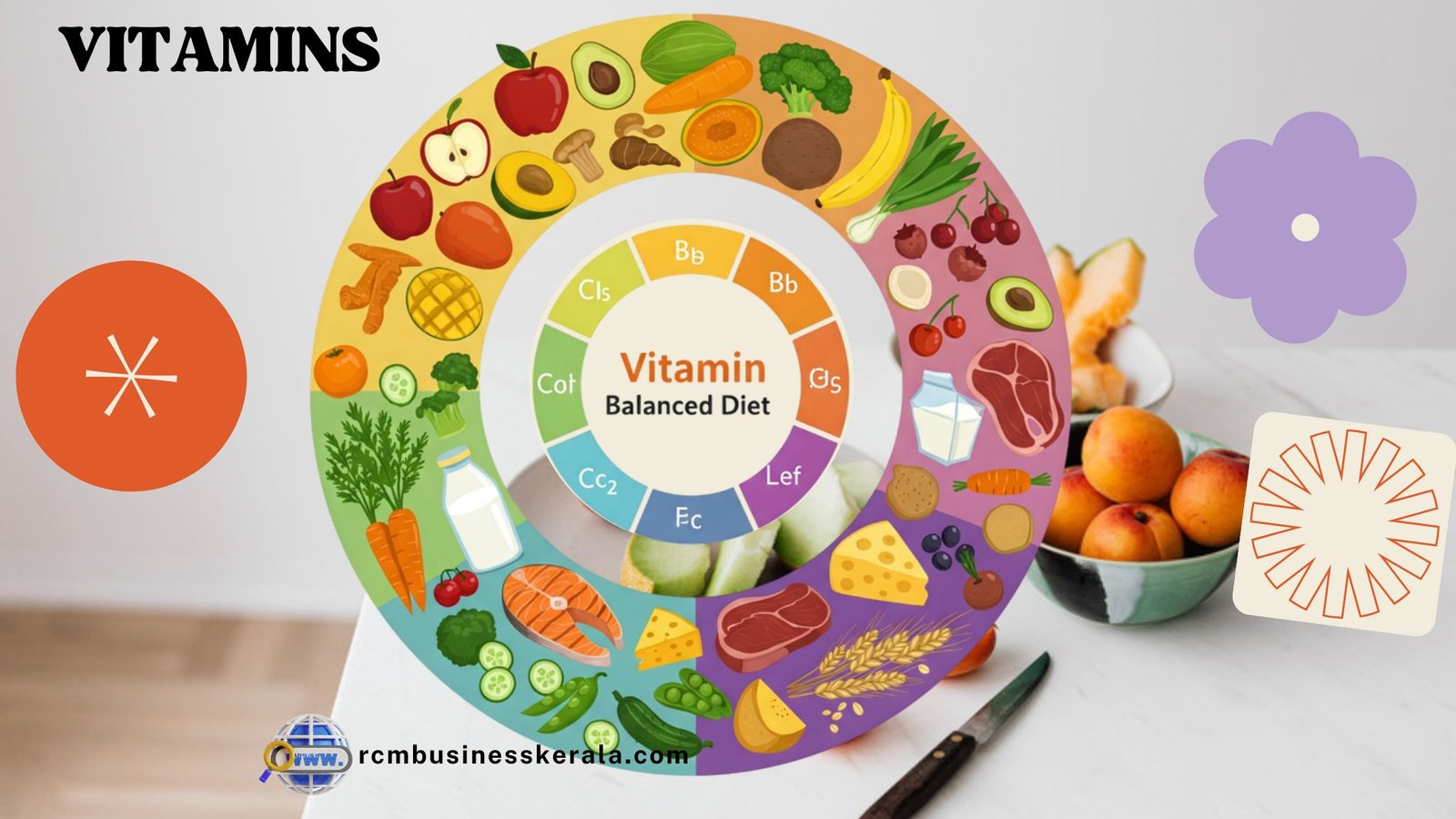VITAMINS
വിറ്റാമിനുകൾ.

പല ഭക്ഷണങ്ങളിലും ചെറിയ അളവിൽ അടങ്ങിയിരിക്കുന്ന സംയുക്തങ്ങളാണ് വിറ്റാമിനുകൾ. അവ ശരീരത്തിന് സമന്വയിപ്പിക്കാൻ കഴിയില്ല, അതിനാൽ അവ ഭക്ഷണത്തിലൂടെ നൽകണം. വിറ്റാമിനുകൾ വളരെ ചെറിയ അളവിൽ ആവശ്യമാണെങ്കിലും ശരീരത്തിൻ്റെ നല്ല ആരോഗ്യവും ക്ഷേമവും നിലനിർത്തുന്നതിന് അവ വളരെ അത്യാവശ്യമാണ്.
ശരീരത്തിലെ വളർച്ചയും വികാസവും, അണുബാധകളിൽ നിന്നുള്ള സംരക്ഷണം, ശരീരത്തിൻ്റെ ഘടനയുടെയും രോഗപ്രതിരോധ സംവിധാനത്തിൻ്റെയും പരിപാലനം തുടങ്ങിയ വിവിധ പ്രവർത്തനങ്ങൾ നിർവഹിക്കുന്നതിന് വിറ്റാമിനുകൾ ഉത്തരവാദികളാണ്. അവരിൽ പലരും പ്രോട്ടീൻ, കൊഴുപ്പ്, കാർബോഹൈഡ്രേറ്റ് തുടങ്ങിയ പ്രധാന പോഷകങ്ങളുടെ ഉപയോഗത്തിൽ ഏർപ്പെടുകയും ഊർജ്ജം പ്രകാശനം ചെയ്യാൻ സഹായിക്കുകയും ചെയ്യുന്നു. ചില വിറ്റാമിനുകൾ ആൻറി ഓക്സിഡൻ്റുകളായി പ്രവർത്തിക്കുന്നു, ഇത് കോശങ്ങളുടെ ഓക്സിഡേഷനും ഫ്രീ റാഡിക്കലുകളുടെ രൂപീകരണവും തടയുന്നു, അങ്ങനെ പ്രായമാകൽ പ്രക്രിയയും വിവിധ വിട്ടുമാറാത്ത രോഗങ്ങളുടെ ആരംഭവും വൈകിപ്പിക്കുന്നു. വിവിധ എൻസൈമുകളുടെയും ഹോർമോണുകളുടെയും ഉത്പാദനത്തിനും വിറ്റാമിനുകൾ ആവശ്യമാണ്.
വിറ്റാമിനുകൾ രണ്ട് തരത്തിലാണ്:
വെള്ളത്തിൽ ലയിക്കുന്ന വിറ്റാമിനുകളും കൊഴുപ്പ് ലയിക്കുന്ന വിറ്റാമിനുകളും
വെള്ളത്തിൽ ലയിക്കുന്ന വിറ്റാമിനുകൾ ശരീരത്തിൽ സംഭരിക്കപ്പെടുന്നില്ല, കൂടാതെ ആവശ്യത്തിലധികം കഴിക്കുന്ന അളവ് മൂത്രത്തിലൂടെ ശരീരത്തിൽ നിന്ന് നീക്കം ചെയ്യപ്പെടുന്നു. അതുകൊണ്ടാണ് ഈ വിറ്റാമിനുകൾ ദിവസവും കഴിക്കേണ്ടത് പ്രധാനമാണ്. വെള്ളത്തിൽ ലയിക്കുന്ന വിറ്റാമിനുകൾ ചൂട്, വായു, വെളിച്ചം എന്നിവയിൽ സമ്പർക്കം പുലർത്തുമ്പോൾ സ്ഥിരതയുള്ളതല്ല, നശിക്കുന്നു, അതിനാൽ ഈ വിറ്റാമിനുകളുടെ അനുബന്ധം ആവശ്യമായി വന്നേക്കാം. എല്ലാ ബി-കോംപ്ലക്സ് വിറ്റാമിനുകളും വിറ്റാമിൻ സിയും വെള്ളത്തിൽ ലയിക്കുന്ന വിഭാഗത്തിൽ പെടുന്നു.
കൊഴുപ്പ് ലയിക്കുന്ന വിറ്റാമിനുകൾ: കരളിൽ സൂക്ഷിക്കുന്നു, ശരീരത്തിൽ നിന്ന് പുറന്തള്ളപ്പെടാത്തതിനാൽ അധിക അളവിൽ കഴിക്കുന്നത് ശരീരത്തിന് ദോഷകരമാണ്. അവ വെള്ളത്തിൽ ലയിക്കുന്ന വിറ്റാമിനുകളേക്കാൾ സ്ഥിരതയുള്ളതും ഭക്ഷണം പാകം ചെയ്യുമ്പോഴും സംസ്കരിക്കുമ്പോഴും നഷ്ടപ്പെടാനുള്ള സാധ്യത കുറവാണ്. വിറ്റാമിൻ എ, ഡി, ഇ, കെ എന്നിവ കൊഴുപ്പ് ലയിക്കുന്ന വിഭാഗത്തിലാണ് വരുന്നത്. കൊഴുപ്പ് ലയിക്കുന്ന വിറ്റാമിനുകളിൽ, വിറ്റാമിൻ ഡിയുടെ കുറവ് ഏറ്റവും സാധാരണമാണ്, ഇത് പൊതുജനങ്ങൾക്കിടയിൽ വ്യാപകമായി കാണപ്പെടുന്നു. അത്തരം സന്ദർഭങ്ങളിൽ വിറ്റാമിൻ ഡിയുടെ സപ്ലിമെൻ്റേഷൻ ആവശ്യമാണ്, കാരണം ഇത് ഒരു ഭക്ഷണപദാർത്ഥത്തിലും വലിയ അളവിൽ ഇല്ല.
13 വിറ്റാമിനുകൾ സാർവത്രികമായി അംഗീകരിക്കപ്പെട്ടിട്ടുണ്ട്, അവ നമ്മുടെ ശരീരത്തിൽ ഒരു പ്രധാന പങ്ക് വഹിക്കുന്നുണ്ടെന്ന് കണക്കാക്കപ്പെടുന്നു, എന്നാൽ രണ്ട് വിറ്റാമിനുകൾ കൂടി ഉണ്ട്, അതായത് കോളിൻ, ഇനോസിറ്റോൾ എന്നിവ ധാരാളം പ്രവർത്തനങ്ങൾ നിർവ്വഹിക്കുകയും ശരീരത്തിന് ഗുണം ചെയ്യുകയും ചെയ്യുന്നു. ഓരോ വിറ്റാമിനിനും ശരീരത്തിൽ ഒരു പ്രത്യേക പ്രവർത്തനം ഉണ്ട്, എന്നാൽ അവയ്ക്കൊന്നും വ്യക്തിഗതമായി കാര്യക്ഷമമായി പ്രവർത്തിക്കാൻ കഴിയില്ല. അവർ പരസ്പരം പ്രവർത്തിക്കുമ്പോഴോ പോഷകസമൃദ്ധമായ ഭക്ഷണത്തിലൂടെ നൽകുന്ന കാർബോഹൈഡ്രേറ്റ്, പ്രോട്ടീൻ, കൊഴുപ്പ് എന്നിവയുമായി സംയോജിപ്പിക്കുമ്പോഴോ മാത്രമേ അവ ഫലപ്രദമാകൂ.
ഓരോ വിറ്റാമിൻ്റെയും പ്രവർത്തനങ്ങൾ, ഉറവിടങ്ങൾ, കുറവിൻ്റെ ലക്ഷണങ്ങൾ, ദൈനംദിന ആവശ്യകതകൾ എന്നിവ തുടർന്നുള്ള പേജുകളിൽ വിശദമായി ചർച്ചചെയ്യുന്നു.
VITAMINS

Vitamins are those compounds which are present in small amounts in many foods. They cannot be synthesised by the body, hence they must be supplied by the diet. Although vitamins are required in very small quantities but they are very essential for maintaining the good health and well-being of the body.
Vitamins are responsible for carrying out various functions in the body such as growth and development, protection against infections and maintenance of body’s structure and immune system. Many of them are involved in the utilisation of important nutrients like proteins, fats and carbohydrates and help in the release of energy. Some vitamins function as anti-oxidants which prevent the oxidation of cells and formation of free radicals and thus delay the process of ageing and onset of various chronic diseases. Vitamins are also required for the production of various enzymes and hormones.
Vitamins are of two types:
Water-soluble vitamins and Fat soluble vitamins
Water soluble vitamins are not stored in the body and the ingested quantity in excess of the requirement gets removed from the body through urine. That is why it is important to consume these vitamins daily. Water soluble vitamins are not stable when exposed to heat, air and light and get destroyed and hence supplementation of these vitamins may be necessary. All B-complex vitamins and Vitamin C come under the water soluble category.
Fat soluble vitamins: are stored in the liver and any excess quantity eaten can be harmful for the body since they do not get excreted out from the body. They are more stable than water soluble vitamins and are less likely to be lost while cooking and processing of foods. Vitamins A, D, E, K come under fat soluble category. Among fat soluble vitamins, Vitamin D deficiency is most common and is widely prevalent among the general population. Supplementation of vitamin D is needed in such cases as it is not present in large quantities in any foodstuff.
There are 13 vitamins universally recognised and are considered to have an important role in our body but there are two more vitamins i.e. Choline and Inositol which perform many functions and are beneficial for the body. Every vitamin has a specific function in the body but none of them can work efficiently individually. They are effective only when they work with one another or in combination with carbohydrates, protein and fats that are provided by a nutritious diet.
The functions, sources, deficiency symptoms, daily requirements of every vitamin are discussed in detail in the subsequent pages.

